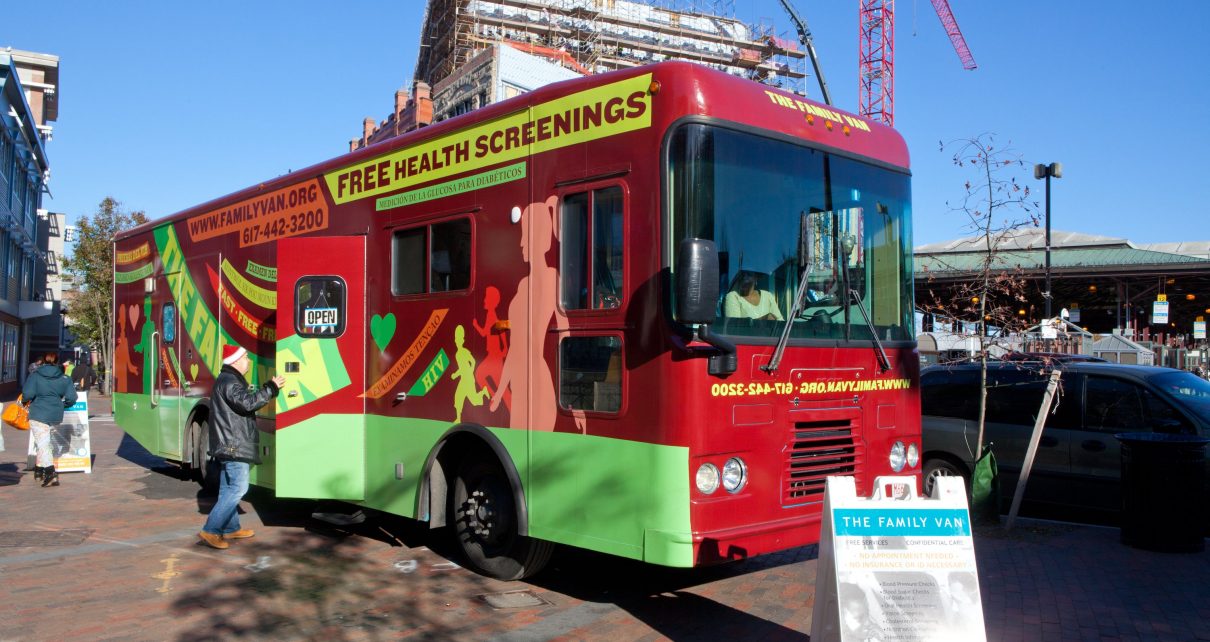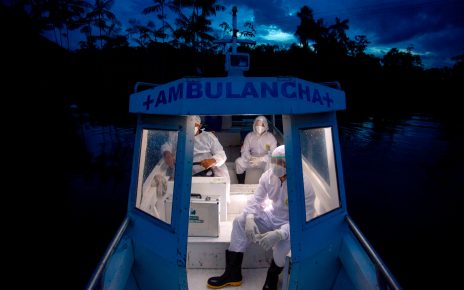Every week, a maroon-and-lime-tinted truck parks in some of Boston’s most underserved communities. The truck is a mobile health clinic called the Family Van. It sits curbside, doors open, with staff ready to provide free health services, screening and health education to anyone who needs it. The Family Van has been doing this for more than 28 years—and in that time, it has reached patients who are often missed by our health care systems: the uninsured, underinsured and undocumented, vulnerable groups that the United Nations secretary-general has warned must not be left behind in our COVID-19 response.
The Family Van is one of many mobile health clinics that work closely with marginalized communities. The United States currently has an estimated 2,000 mobile health clinics that receive 6.5 million visits annually; 60 percent of those patients are uninsured and 31 percent publicly insured (Medicaid, Medicare, CHIP). As the COVID-19 outbreak continues to grow, urgent questions remain on how to best support these communities: what happens to individuals in rural areas who don’t live near a hospital? How do we support older Americans, many of whom are food-insecure? How do we arm vulnerable groups with facts and up-to-date information in order to help combat COVID-19 misinformation?
There’s no silver bullet. Multiple tools will certainly be needed, but mobile health clinics may prove invaluable in this fight.
We saw this firsthand recently as we were able to virtually gather more than 330 mobile health clinic leaders from around the country for a webinar designed to exchange ideas and best practices within the sector. In discussion among leaders from both rural and urban settings, innovative solutions were being built from the ground up.
Through grassroots actions, some mobile clinics have transformed their units to deliver essential hygiene and food items to those in need. Others are deploying their units for mobile COVID-19 testing, and the Family Van is now providing telecare and distributing COVID-19 informationals in different languages. Opportunities to utilize mobile clinics in this growing pandemic remain vast. But more collaboration is needed with those outside of mobile health, particularly governments and hospitals, to upscale these efforts.
This sounds intuitive but it isn’t easy. Nearly one third of mobile clinics are independent programs, and most are not affiliated with hospital systems. The majority of mobile clinics are funded by philanthropy. Capturing this wide network of mobile clinics remains an elusive challenge: Mobile Health Map, an online database, has worked on this task for the past 13 years, and while it has managed to pinpoint more than 800 mobile clinics around the country, that is still less than half of the estimated fleet.
To effectively reach mobile clinics, the work must start locally. Community collaborations between local government, hospitals and mobile clinics will pay dividends toward combating this pandemic. Previous experience shows us the value of this approach: during the Flint water crisis, it was mobile health clinics that were deployed to provide necessary resources and care to those in need. In 2005, when the storms of Hurricane Katrina struck the Gulf Coast, leaving much of the infrastructure damaged, mobile health clinics were utilized to provide care in communities who were suddenly lacking hospitals.
Mobile clinics are known to reduce emergency department visits, hospital admissions, and improve chronic care management—all while reducing cost. Even more, because mobile clinics meet people in their communities, they foster higher levels of trust with patients, which is key to fighting this pandemic.
As policy makers scramble for strategies to mitigate the impact of this outbreak, there remains a need to develop more strategies to support vulnerable communities during this time. It’s no secret that global pandemics, like COVID-19, have a tendency to disproportionately impact marginalized groups. Outbreaks have a way of exacerbating health inequities and laying bare social inequalities. Instead of simply accepting this injustice, let’s do more to combat it. Let’s build on community programs and resources that serve those most in need. Let’s bring mobile clinics and health systems together so we can collectively fight this fight.
Note: The online webinar was hosted by Mobile Health Map, a program of Harvard Medical School and the Mobile Healthcare Association.




